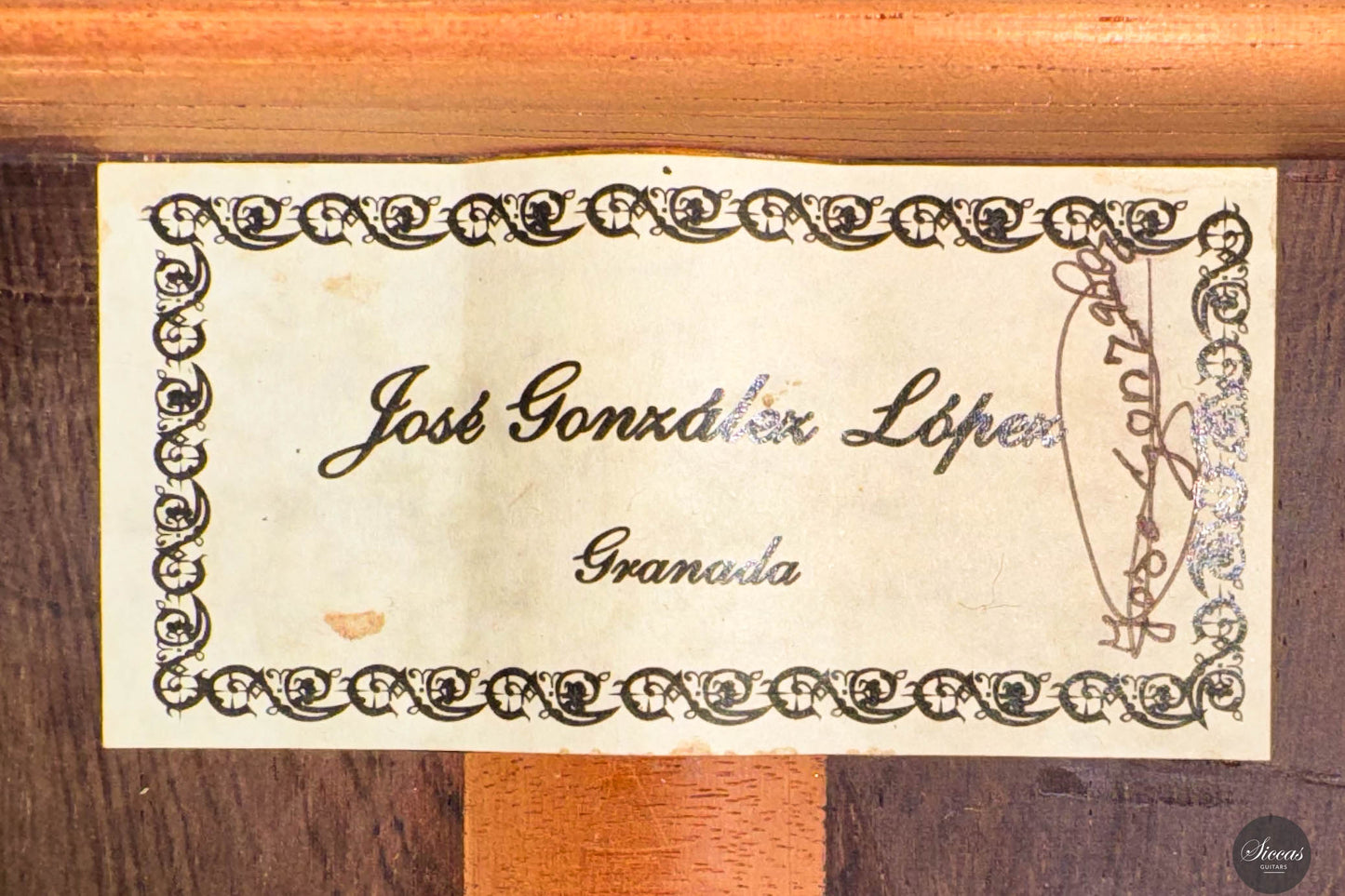José González López - 2025 Cedar - Madagascar rosew. No.317 64 cm
José González López - 2025 Cedar - Madagascar rosew. No.317 64 cm
Details
Details
Overview
Overview
Shipping important note
Shipping important note
Important: Additional costs such as import taxes and custom duties may occur when importing goods from the EU into your country.
Delivery times are typically reliable and most instruments arrive within the estimated timeframe.
Should any unexpected delay occur, our team will keep you informed and provide support at every step. For all shipping details and exceptions, please see our Shipping Policy.
Details about GPSR
Details about GPSR

























Video overview


More details about the guitar
About the luthier
José González López was born in Órgiva (Granada) in 1961. At the age of 28, José started his guitar-making apprenticeship in Antonio Marin Montero’s and José Marin Plazuelo’s workshop. It is under the guidance of the two great masters that he built his first guitars, and his craft still carries the unmistakable character of Antonio Marin Montero’s philosophy. Jose Gonzalez Lopez’s guitars sound powerful and very dynamic with a quick response.About the guitar
This brand-new guitar by José González López, one of the most respected luthiers in Granada, truly embodies the essence of the Granada school of guitar making. Having studied under the legendary Antonio Marín Montero, José has developed his own sound ideal, deeply rooted in the Granada tradition yet marked by a distinct personal voice. The guitar is lively and responsive, with bright, vibrant trebles. It carries the crisp attack typical of southern Spanish guitars, while the cedar soundboard adds warmth and lyricism to the upper register. The basses are dry, crunchy, and well-defined, providing a solid foundation for the guitar’s overall tonal palette. In addition, the instrument is rich in tonal color, allowing the player to explore a wide range of expressive possibilities.Regular care extends the life of the instrument
Even with careful use, a classical guitar may gradually change in appearance or respond to unstable storage conditions. Have a close look at your guitar regularly and be attentif to changes. If your instrument is suffering from its environement, it will let you know.
Protect Your Guitar: Handle with Care
Be mindful when touching your instrument with greasy or unwashed hands: any skin contact is a small attack on the varnish. Of course, a guitar is made to be played, but taking a few precautions helps preserve its beauty: wash your hands before playing, wear long sleeves, and avoid unnecessary direct skin contact with the body of the instrument.
Pro tip: Avoid playing with a button-up shirt, heavy jewelry, or a belt, as these can scratch the guitar. Also, make sure your guitar case is free of any objects that could damage the instrument during storage.
String care
A good habit to adopt is wiping down your strings briefly after each playing session. This small action significantly extends their lifespan and helps maintain a consistent, comfortable feel under your fingers.
Most importantly, clean strings are essential for keeping your instrument in tune. Corrosion, sweat, and dust can affect the uniformity of the strings and interfere with accurate tuning across the entire fingerboard.
Pro tip: If you're having trouble getting your guitar in tune, it might be time to change the strings. A useful test is to compare the pitch of the 12th fret harmonic with the fretted note at the 12th fret; if there's an unusually large gap between them, your strings may have lost their integrity and should be replaced.
Keep Your Shellac Finish Shining!
Got a guitar with a shellac (French polish) finish? Here's a simple trick: Take a clean microfiber cloth and gently breathe on the surface to create a light mist. Then, softly rub to remove fingerprints, sweat, and grease. That’s usually all it takes to keep it looking great, no products needed!
Pro tip: Every few years, treat your guitar to a check-up with a luthier to keep it in top shape.
Storing Your Guitar: Climate Matters
Your guitar can safely stay outside its case, as long as the surrounding environment maintains 42–55% humidity and a temperature between 18–25°C.
Keep in mind that humidity levels can still fluctuate inside the case, especially during seasonal changes.
- Too much humidity may cause overtightened strings and a dull tone.
- Too little humidity can lead to a bulging top, string buzz, or even cracks.
Avoid placing your guitar near radiators, air conditioners, or windows with direct sunlight.
Pro tip: Always close your guitar case while playing. This helps preserve a stable microclimate inside the case, so your instrument is protected the moment you put it back in.





















































